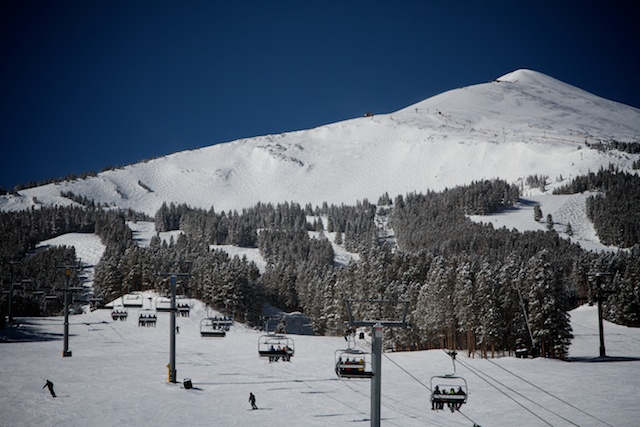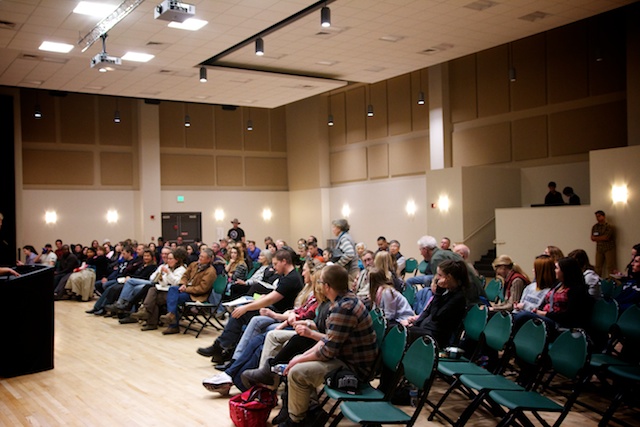After a wonderful meal cooked by Chris Saturday night, we spent Sunday skiing on Breckenridge, a bit of a surreal experience after spending so much time focused on agriculture.

Exhausted we had a good meal together and watched comedies and a bit of the Oscars before calling it a night. We said goodbye to Brooke and Chris, it's always a great time when we're with Chris on the road.
Today we got to sleep in a bit, and sent out e-mails, took photos and made phone calls. We made it out of Breckenridge about 2pm and went over Hoosier Pass, at one point stuck behind a snow plow for about 20 miles. The views are expansive, mountains in all directions, and with the recent outpouring of snow, the land itself often took on sleek, stark shapes.
We arrived just in time at UCCS, University of Colorado- Colorado Springs, where about 125 people came together for the screening. The panel following was phenomenal, so much so that we went a full hour. Mike Callicrate started out as a conventional farmer, graduating with a degree in Animal Science from CSU in 1975, and ten years later decided to change the food system. The result is the thriving business Ranch Foods Direct. He spoke with an authority and charisma about a number of topics, from the history of fracking and it's impact on agriculture, to the importance of buying directly from farmers.

Susan, of the incredibly well known Venetucci Farms, is deeply rooted in the local community, and frequently told people about local resources where they can buy food from farmers, take classes in chicken butchering, get a farm job. She, like Mike, talked about the importance of vigilantly asking restaurants where they source food from, to not let restaurants get away with vague labels.
Lena started her own farm 3 years ago, working with her husband to raise their own food. She expressed with refreshing honesty, the steep learning curve, which led to the death of a number of animals, a reality that is inherent in any type of agriculture, especially at the outset of any farm. She got a number of questions from young students who were curious how she got started, how much work she had to do, and what it might take for one of them to start something of their own.
At one point a fellow named Eric asked about the impact of fracking on agriculture. Susan mentioned that it diverted water from agriculture. Mike talked about how he knew the person who pioneered the method in the region, a fellow by the name of Neil McMurry in Casper, Wyoming. He found a way to blast up the shale underground, which released the gas, however, frequently polluted the water, leading to cattle getting sick, and a shortage of water. There's a meeting tomorrow at 1pm at City Hall in Colorado Springs where people hope that their voices will be heard as the issue of fracking comes up in Colorado Springs, an area even more dependent on fresh clean water than most.
It's clear that all these environmental challenges that we face as a people are intertwined. Shortage of water, pollution, climate change, health, ecology, all these things are directly tied to one another, and to be successful, we're going to build on what we've all learned, share resources, and mobilize this growing group of us who are ready for a total shift in the way everything happens.
Do you like this post?